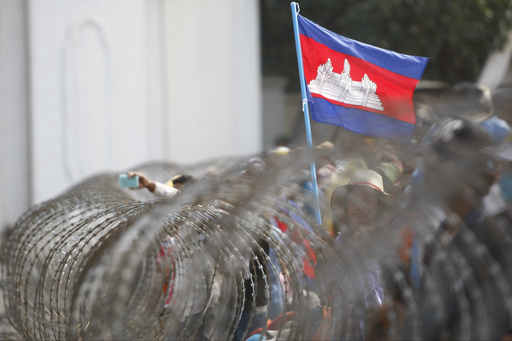
PHNOM PENH, Cambodia — On Wednesday, the Cambodian Interior Ministry confirmed that it had barred British journalist Gerald Flynn from reentering the country due to complications with his visa. This development has stirred concerns regarding press freedoms in Cambodia, where the media landscape faces significant challenges. Flynn, who reports for the U.S.-based environmental news site Mongabay, traveled briefly to Thailand in January before being denied reentry into Cambodia. Interior Ministry spokesperson Touch Sokhak stated that Flynn had misrepresented his visa application by claiming to be an electrician while actually working as a journalist. “He cheated Cambodia,” Sokhak remarked.
In response, Flynn labeled the accusation as “bizarre,” emphasizing that the blacklisting occurred shortly after he was featured in a France24 documentary that examined the environmental impacts of Cambodia’s carbon offsetting initiatives. “I have always worked as a journalist in Cambodia and have represented myself as such to the government,” Flynn articulated in a statement. He expressed skepticism about the government’s explanation, arguing that the timing of his exclusion indicated it was related to his investigative journalism that often exposed the links between influential figures and environmental degradation.
Mongabay released a statement affirming Flynn’s journalistic credentials, noting that he had operated in Cambodia for five years and had always been transparent about his role. The publication highlighted that Flynn had consistently maintained a valid press pass during his tenure. The political climate has been tense under Prime Minister Hun Manet, who succeeded his father Hun Sen earlier this year after nearly four decades in power. Since taking office, Hun Manet has shown little inclination toward political liberalization, continuing to suppress dissent among political opponents and critics alike.
In September, highly regarded journalist Mech Dara faced arrest and was swiftly convicted of incitement after publishing articles that exposed corruption and online scams. Following this incident, the U.S. State Department expressed its “deep concern” regarding his detention, while numerous Cambodian media entities and civil society groups called for his immediate release and urged an end to harassment against journalists. The risks for journalists became painfully evident in December when Chhoeung Chheng was fatally shot while covering illegal timber transport in Siem Reap province. The Committee to Protect Journalists condemned the act, indicating that it underscores the peril that environmental reporters encounter in Cambodia and urged the government to enhance protections for such journalists.
The Foreign Correspondents’ Club of Thailand has voiced its serious concerns over Flynn’s blacklisting, highlighting the grim situation for the press in Cambodia. “This is another nail in the coffin for free press in Cambodia, where both local and foreign journalists have faced severe intimidation in recent years, resulting in numerous news organizations being forced to shut down,” the organization stated.

